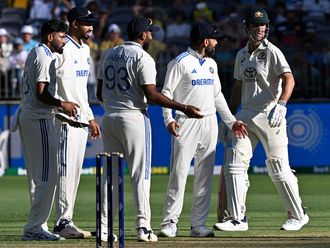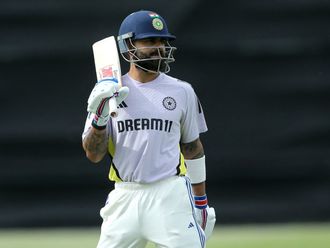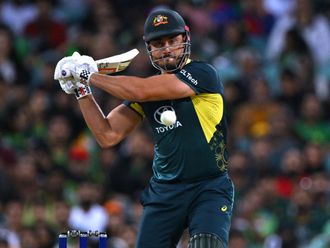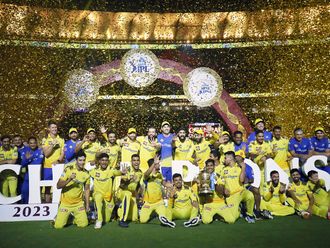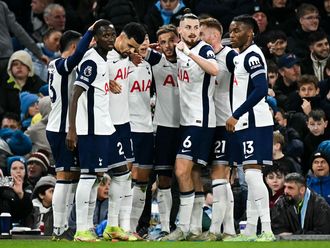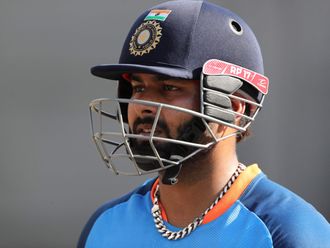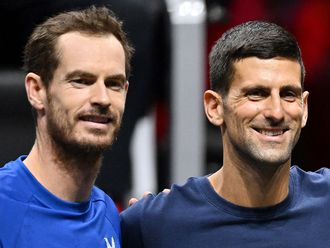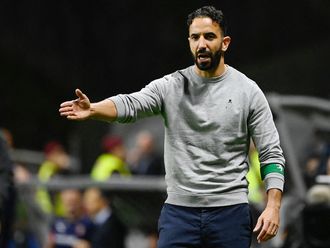
Mumbai: England’s miserable early exit from the World Cup has left the reigning champions facing several questions but with few simple answers.
A departure before the knockout stages was finally confirmed by Saturday’s 33-run loss to arch-rivals Australia in Ahmedabad — with England’s sixth defeat in seven games at the tournament leaving them rock bottom of the 10-team table.
Even non-Test playing Netherlands, the lowest-ranked side, have managed two wins.
It was their batting that let England down again as they failed to chase a target of 287 that would once have been well within the grasp of a powerful top order.
England have managed just one individual century in this World Cup thus far, through Dawid Malan, with star batsmen Jonny Bairstow, out for a duck on Saturday, and Joe Root failing to fire.
Broader issues have also been involved in a dramatic fall from their 2019 World Cup triumph.
Early defeats
Early defeats by New Zealand and Afghanistan led England to abandon their policy of picking a side full of all-rounders, only for team management to then reverse course again as they struggled to find a winning formula.
A similar lack of clarity was also evident in the approach of England’s batsmen, caught between the policy of all-out aggression, that had served the team so well under now retired World Cup-winning skipper Eoin Morgan, or instead laying a foundation and then accelerating.
Much of the focus now will be on England white-ball captain Jos Buttler and limited-overs coach Matthew Mott.
But ditching Buttler as skipper and replacing experienced Australian coach Mott won’t be straightforward given England have a Twenty20 World Cup title to defend in the United States and the West Indies in June.
That event may also delay a rebuild of England’s white-ball team, with only four members of their original 15-man World Cup squad under the age of 30.
‘Completely spooked’
Another complicating factor is that during this tournament, the England and Wales Cricket Board (ECB) announced a new raft of central contracts that included all their largely under-performing World Cup squad, with the curious exception of hard-grafting pacman David Willey — who announced his international retirement days later.
The ECB also introduced multi-year deals for the first time.
Injury prone fast bowler Mark Wood, 33, whose six tournament wickets have cost an expensive 58 runs apiece, has been given a three-year contract.
But former England captain Michael Vaughan insisted the ECB had been “completely spooked “ by suggestions players would quit the international game altogether in favour of lucrative franchise deals.
“Let them sign multi-year franchise contracts if they want because players will always want to play for England, and if they don’t, fine, pick someone who does,” Vaughan added.
Low-grade affairs
The downgrading of the domestic One-Day Cup, because of the advent of The Hundred, has hampered England’s development of new 50-overs players.
So too has a reduction in the number of England’s ODIs — 42 in the four years prior to this World Cup compared to 88 in the equivalent cycle before the 2019 edition.
Too many of those games have been low-grade affairs, with England often not fielding their strongest side, in part because of the difficulty of balancing all their international commitments.
It all led to a complacent ‘it will be all right on the night’ approach that has been found spectacularly wanting in India.
Promising batsman Harry Brook may now be recalled for England’s last two World Cup matches.
But things could yet get worse before they get better as England need to finish in the top eight to be assured of qualification for the 2025 Champions Trophy.
Defeats by the Netherlands and Pakistan could see England fail to be involved in a major ICC men’s tournament for the first time in their history.
It all adds up to the biggest challenge of Rob Key’s 18-month reign as England managing director, which, thanks mainly to a resurgent Test side, has so far largely been a story of success.
In the meantime gifted batsman Buttler, whose run of low scores continued when out for one against Australia, was left saying: “We’ve let ourselves down. We’ve let down people down at home, who support us through thick and thin and we wear that on our own shoulders.”
‘Not good enough’
Moeen Ali said England’s exit from the World Cup could be the end of an era for the 2019 champions, admitting they had “not been good enough” in India.
A majority of the squad are in their 30s and unlikely to play in the next edition in 2027 as England look to rebuild.
Asked if it was the end of a great 50-over team, the 36-year-old all-rounder Moeen responded: “Yeah, maybe.”
England, captained by Buttler and coached by Matthew Mott, started as one of the tournament favourites but they flopped spectacularly, with multiple batting collapses.
“It’s just lack of confidence, especially in the batting department,” said Moeen.
“The lack of runs, especially in a part of the world, where in India it can be nice to bat but it can be difficult, it’s probably a different approach, but we haven’t been good enough.”
The Chris Woakes-led attack restricted Australia to 286 and kept India’s powerful batting line-up down to 229-9 in their previous match, but England’s batsmen failed to capitalise each time.
“The bowling has got better over the last two games in particular,” said Moeen.
“But no positives really, we are bottom of the table with two points in a World Cup in which we expected to do better.”
‘Anything could happen’
Moeen tried to look to the future, recalling the 2015 World Cup debacle when Bangladesh knocked out Eoin Morgan’s England.
They rebuilt to win their maiden 50-over World Cup at home four years ago and then triumphed in the T20 World Cup in Australia last year.
“I look at it as an exciting time going forward because there are so many good players, we know they are coming,” Moeen said.
“Anything could happen there are still another four years before the next World Cup.
“Like 2015, we were terrible in the World Cup and we started again, almost started fresh and it can be exciting going forward.”
Many of England’s current stars including Buttler (33), Ben Stokes (32) Dawid Malan (36) and Joe Root (32) are unlikely to feature in the 2027 edition to be hosted jointly by South Africa, Zimbabwe and Namibia.
But rising stars such as Harry Brook offer hope of an England resurrection.
On the topic of mental health in such dire times, Moeen said the players have stuck together.
“The support is there if somebody is mentally struggling,” he told reporters.
“The guys are very open and we are very close as a group of players and if somebody needs our support then it’s there for sure. These things could happen but it is a game of cricket, you try your best.”


